Printable Version of Topic
Click here to view this topic in its original format
914World.com _ 914World Garage _ hood venting a radiator
Posted by: tazz9924 Jun 26 2019, 02:11 PM
I found these on the interwebs: https://www.summitracing.com/parts/tak-u5512shl/
Im thinking it’ll do for venting my radiator out of the hood rather than the wheel wells like it is now. These vents are 12”/5.5” and i would run two. My engine is an ej20 turbo. Any input is appreciated
Posted by: Chi-town Jun 26 2019, 02:14 PM
I plan to do the same, cutting up the wheel wells only weakens the front structure
Posted by: tazz9924 Jun 26 2019, 02:24 PM
I plan to do the same, cutting up the wheel wells only weakens the front structure
Plus the heat from the radiator seems to get pushed inside the car because it doesn’t remove the gasses efficiently enough
Posted by: thelogo Jun 26 2019, 03:10 PM
Luvers look like they will work but this is
What irritates me about a rad in a 914
Venting / cutting up the hood to vent im not a fan
Dont like the look .
Carveing out the inner wheel wells to let heat escape
Really not a fan of that and doesnt seem like a efficient
Exit for the hot air too me
At first i thought a rear wing rad would be the way to go
But now im thinking a ruf style cut out vent between the hood and the bumper top .... Is the best route
![]()
Attached thumbnail(s)
Posted by: SirAndy Jun 26 2019, 03:25 PM
Been there, done that, like it a lot ...
http://www.914world.com/bbs2/index.php?s=&showtopic=44700&view=findpost&p=1838555
http://www.914world.com/bbs2/index.php?s=&showtopic=44700&view=findpost&p=1898832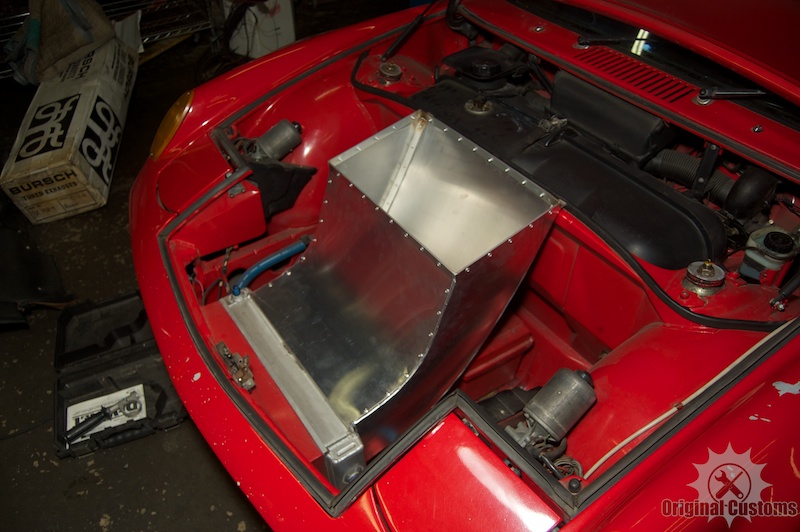
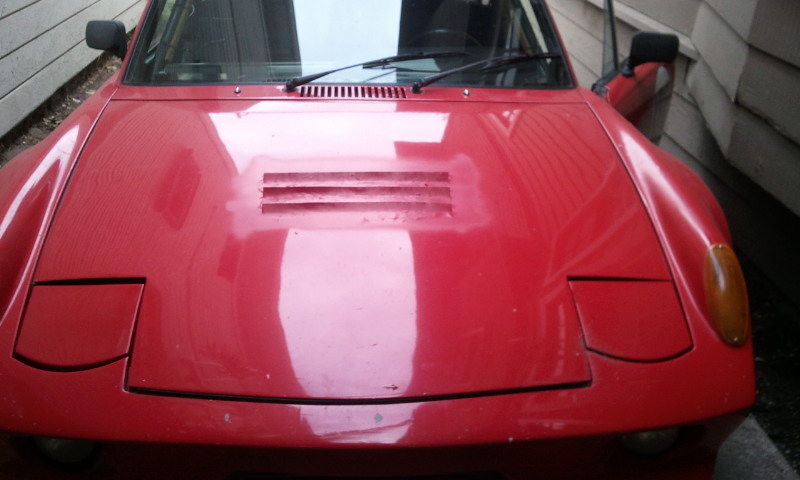
Posted by: DickSteinkamp Jun 26 2019, 04:51 PM
Some smart person here should be able to come up with a formula for square inches needed of the opening for air in and the same for air out. I'm not that smart.
It probably has to do with how much heat the engine is going to generate, the size of the radiator, the material of the radiator, and the CFM of the radiator fans.
I took a guess. Mine is an LB9 305 Chevy making maybe 230 HP.
The opening I cut in my bumper is 22.5" x 5" or 112.5 square inches.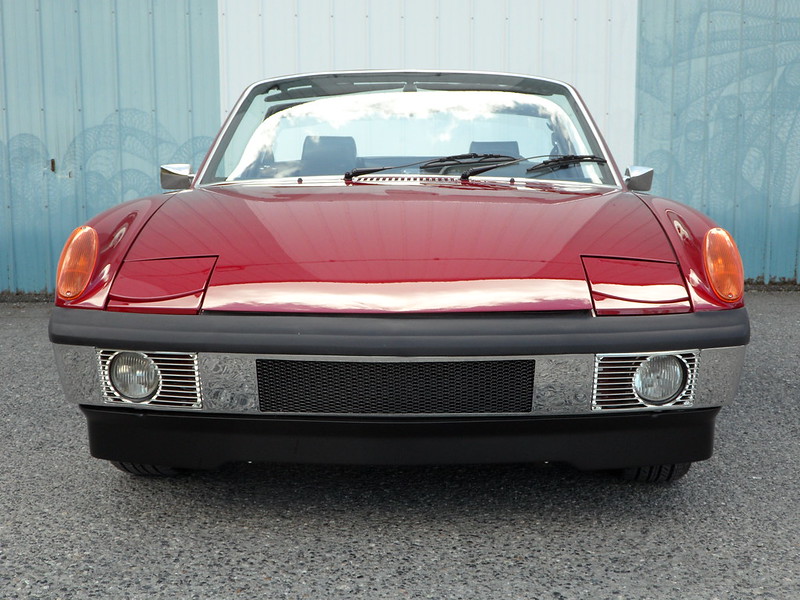
I felt the openings for the air out should be at least as big as the air in opening. Mine are 10" x 8" or a total of 160 square inches for both.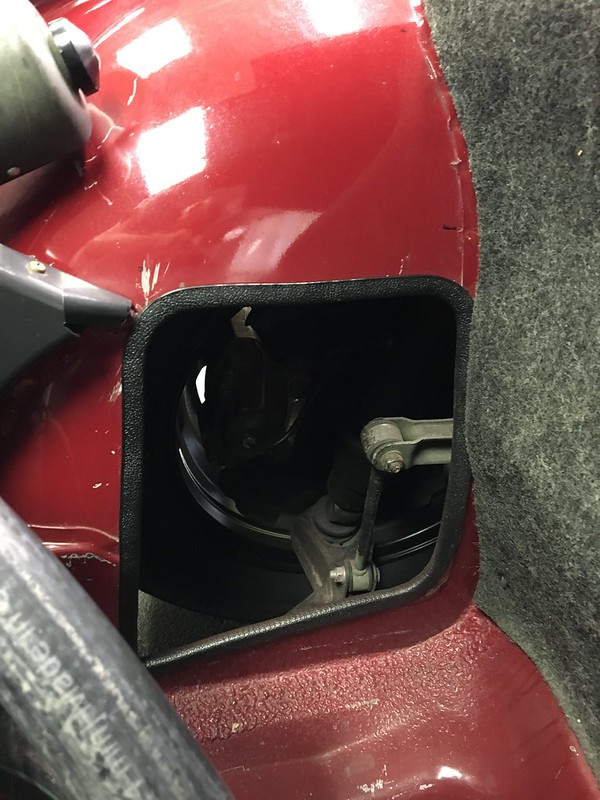
My radiator is Renegade's Ron Davis for a SBC. Aluminum.
It cools fine. Running down the road, the fans do not come on. Idling they will cycle on and off. It runs right on the 160 t-stat. (Disclaimer...I don't live in Phoenix. ![]() )
)
The hood vents linked to are 12" x 5.5" overall. It looks like there is about a 1" mounting boarder on all sides leaving a vent area of 10 x 3.5. This would give you 70 square inches of air out. My GUESS is that this would not be enough (although Sir Andy's seems to work fine with even less space for air out...it could be the custom plenum helps?)
The good news about the vents linked to is that it appears both will fit (barely) without cutting any of the hood support structure and will fit between the rad and the bulkhead in front of the fuel tank.
Posted by: SirAndy Jun 26 2019, 05:23 PM
although Sir Andy's seems to work fine with even less space for air out...
Actually, the surface of the openings in my louvers is just about equal to the surface area of the opening on top of the shroud.
You're just looking at it from the wrong angle ...
Posted by: djway Jun 26 2019, 11:39 PM
I read somewhere that due to the heat expansion of the air the outlet must be 1.2x the area of the inlet.
How much inlet required per HP I have yet to find.
Posted by: falcor75 Jun 27 2019, 12:18 AM
I read somewhere that due to the heat expansion of the air the outlet must be 1.2x the area of the inlet.
How much inlet required per HP I have yet to find.
Yes 1.2-1.5 times the size of the inlet is a rule of thumb used in aircraft design. It also depends on the distance from the inlet to the outlet, longer distance = greater ratio.
Posted by: tazz9924 Jun 27 2019, 05:10 AM
I read somewhere that due to the heat expansion of the air the outlet must be 1.2x the area of the inlet.
How much inlet required per HP I have yet to find.
Yes 1.2-1.5 times the size of the inlet is a rule of thumb used in aircraft design. It also depends on the distance from the inlet to the outlet, longer distance = greater ratio.
That’s good to know actually
Posted by: JeffBowlsby Jun 27 2019, 08:28 AM
Here are some you probly don't want to emulate:
Attached image(s)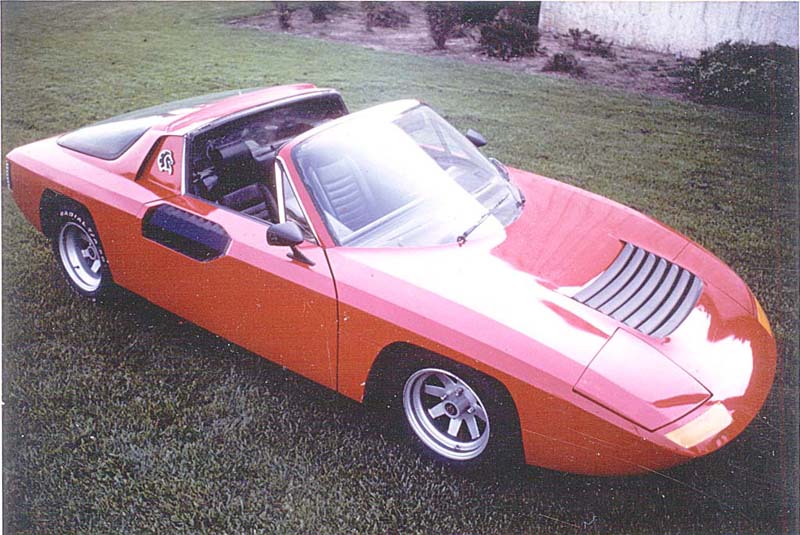
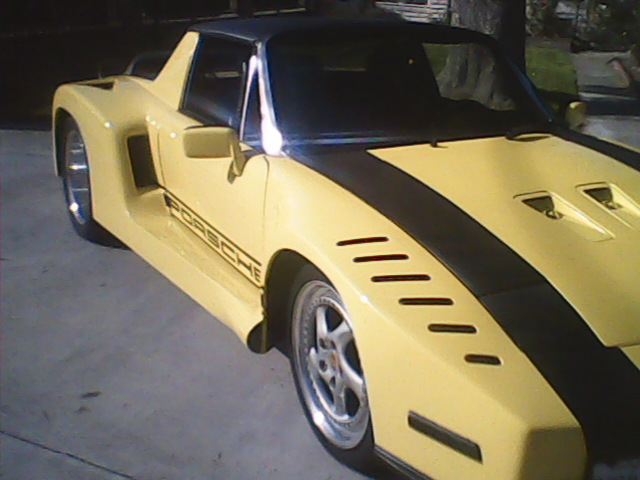
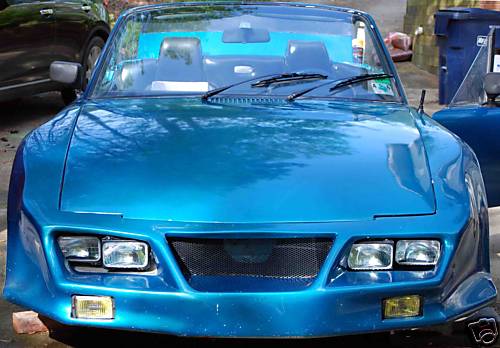
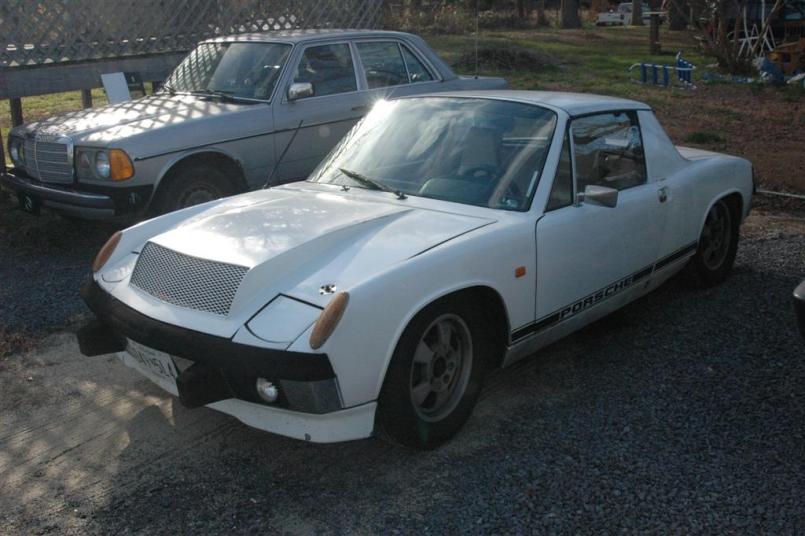
Posted by: 76-914 Jun 27 2019, 08:43 AM
I plan to do the same, cutting up the wheel wells only weakens the front structure
If you cut the wheel wells you need to weld in stiffeners around the cut out. I believe all the radiated conversions will allow some hot air into the cabin unless ducted to the wheel wells. If anyone has a wheel well vented system that does not allow heated air into the cabin I'd love to see their set up.
My solution:
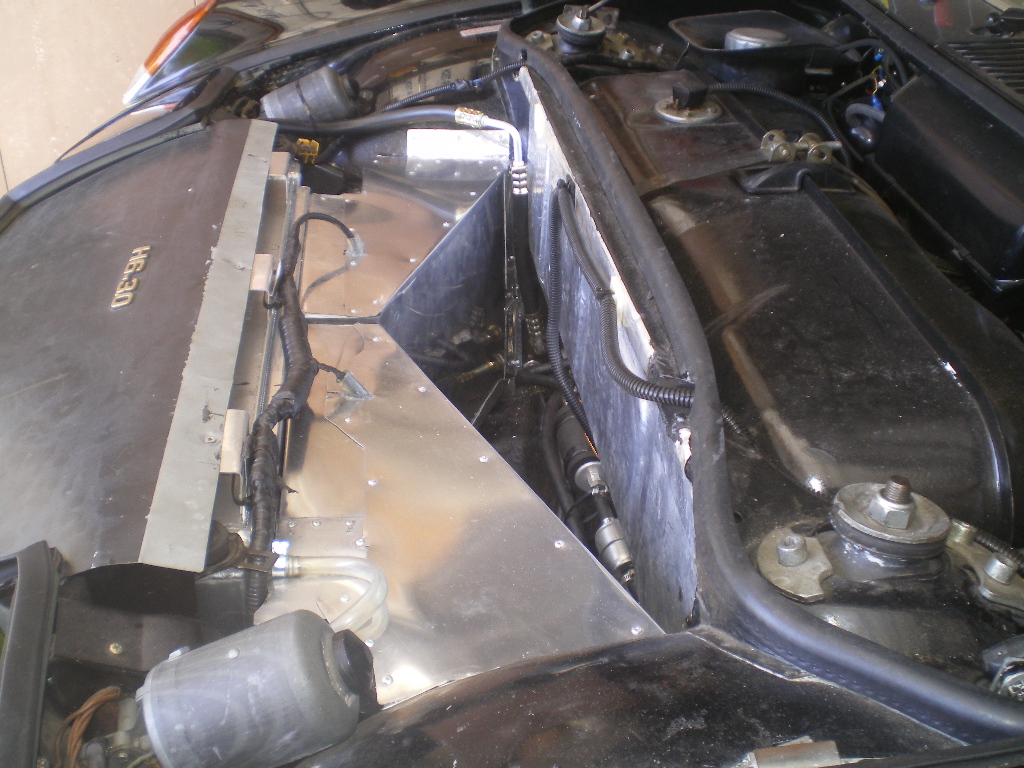
Posted by: DickSteinkamp Jun 27 2019, 09:48 AM
I plan to do the same, cutting up the wheel wells only weakens the front structure
If you cut the wheel wells you need to weld in stiffeners around the cut out. I believe all the radiated conversions will allow some hot air into the cabin unless ducted to the wheel wells. If anyone has a wheel well vented system that does not allow heated air into the cabin I'd love to see their set up.
My solution:

Great solution! I like it. I have a friend with an HVAC biz that can make those ducts for me. I guess mocking them up with cardboard would be the best start.
I would think this would also make the fan noise less obtrusive.
Any details on how you reinforced the wheel well cutouts?
Posted by: tazz9924 Jun 27 2019, 02:33 PM
Here are some you probly don't want to emulate:
is that blue front end off an iroc???
Posted by: Chris914n6 Jun 27 2019, 03:42 PM
The front structure is strong enough to handle a reasonable size cutout in the wheel well.
And with ducting like 76-914 or what I did with my a/c holes in the floor, you can keep some of the trunk space.
There is no formula for air holes to hp. I started with measuring the inlet for the car I took my motor out of plus rad core size and tried to match it. There is a point where airflow from moving is greater than the CFM from the fans, usually 20-30mph.
Posted by: Andyrew Jun 27 2019, 04:19 PM
I believe that the calculation should be for air flow area to cubic inches....
I think engine size makes a much greater difference than total HP.
My 400hp+ 1.8L motor can barely stay warm enough with my toyota celica radiator which is about half the size of my old 5.7+L v8 motor's radiator and it barely kept cool enough.
Posted by: 76-914 Jun 27 2019, 04:54 PM
I plan to do the same, cutting up the wheel wells only weakens the front structure
If you cut the wheel wells you need to weld in stiffeners around the cut out. I believe all the radiated conversions will allow some hot air into the cabin unless ducted to the wheel wells. If anyone has a wheel well vented system that does not allow heated air into the cabin I'd love to see their set up.
My solution:

Great solution! I like it. I have a friend with an HVAC biz that can make those ducts for me. I guess mocking them up with cardboard would be the best start.
I would think this would also make the fan noise less obtrusive.
Any details on how you reinforced the wheel well cutouts?
Dick, I cut and welded 1" strips of 16ga steel around the perimeter. Shaped just like the edge guard you have now only wider. That is also where I attached the 90 degree aluminum flanges that the ducking is tied into at the wheel well. Just don't forget where the plug welds are located as they are Hell to drill thru. BTW, the ducting is the 2nd best improvement I've made on that car. The first being the Suby conversion and the 3rd would be the addition of the AC system. Highjack over.
Posted by: DickSteinkamp Jun 27 2019, 06:06 PM
Dick, I cut and welded 1" strips of 16ga steel around the perimeter. Shaped just like the edge guard you have now only wider. That is also where I attached the 90 degree aluminum flanges that the ducking is tied into at the wheel well. Just don't forget where the plug welds are located as they are Hell to drill thru. BTW, the ducting is the 2nd best improvement I've made on that car. The first being the Suby conversion and the 3rd would be the addition of the AC system. Highjack over.
Thanks!
Did you operate the car before the duct work? If so, was there a difference in engine temp and/or how often the fans came on?
BTW, I hope the OP doesn't consider this a highjack. Great info that I think ties in nicely.
Posted by: tazz9924 Jun 28 2019, 05:53 AM
Dick, I cut and welded 1" strips of 16ga steel around the perimeter. Shaped just like the edge guard you have now only wider. That is also where I attached the 90 degree aluminum flanges that the ducking is tied into at the wheel well. Just don't forget where the plug welds are located as they are Hell to drill thru. BTW, the ducting is the 2nd best improvement I've made on that car. The first being the Suby conversion and the 3rd would be the addition of the AC system. Highjack over.
Thanks!
Did you operate the car before the duct work? If so, was there a difference in engine temp and/or how often the fans came on?
BTW, I hope the OP doesn't consider this a highjack. Great info that I think ties in nicely.
i dont mind
Posted by: jd74914 Jun 28 2019, 07:21 AM
I believe that the calculation should be for air flow area to cubic inches....
I think engine size makes a much greater difference than total HP.
My 400hp+ 1.8L motor can barely stay warm enough with my toyota celica radiator which is about half the size of my old 5.7+L v8 motor's radiator and it barely kept cool enough.
Kinda. Engine efficiency (and radiator air-side efficiency) is really the controlling parameter. Your old V8 was literally likely 50% less efficient than the 1.8T; so the heat load was proportionally higher. Looking in terms of engine size is more or less a surrogate way of thinking about thermal efficiency.
Posted by: 76-914 Jun 28 2019, 08:14 AM
Dick, I cut and welded 1" strips of 16ga steel around the perimeter. Shaped just like the edge guard you have now only wider. That is also where I attached the 90 degree aluminum flanges that the ducking is tied into at the wheel well. Just don't forget where the plug welds are located as they are Hell to drill thru. BTW, the ducting is the 2nd best improvement I've made on that car. The first being the Suby conversion and the 3rd would be the addition of the AC system. Highjack over.
Thanks!
Did you operate the car before the duct work? If so, was there a difference in engine temp and/or how often the fans came on?
BTW, I hope the OP doesn't consider this a highjack. Great info that I think ties in nicely.
No change. The factory Subaru gauge has always remained dead center or 1/2 way between H&C. The ducting just eliminated the hot air overflow into the cabin, which is a God send in my book. One more thing. It eliminated the dirt and dust build up if the frunk. It now stays clean and dry.
Powered by Invision Power Board (http://www.invisionboard.com)
© Invision Power Services (http://www.invisionpower.com)
